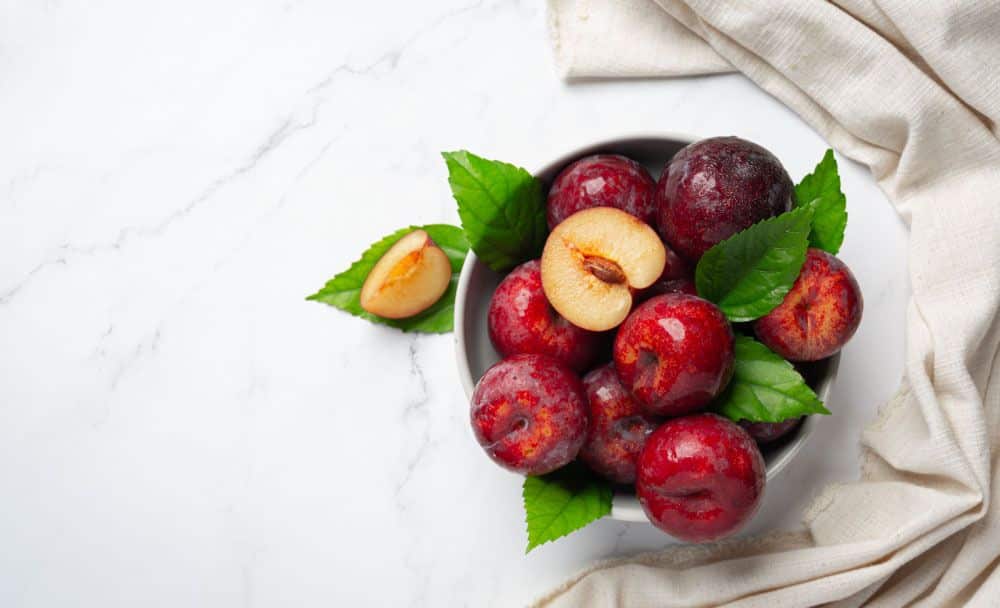
Jujube fruit, also known as Ziziphus jujuba or red date, is prevalent worldwide and has a long history of being used as a traditional healthy food. The fruit is known for its high nutritional content and thus is incorporated into various food products to enhance its overall quality.[1] The small, sweet fruit has a rich history of cultivation and consumption.
Renowned for its delightful flavor, jujube fruit is a delicious snack and offers numerous health benefits. It is rich in vital vitamins and minerals and exhibits antioxidative, anti-cardiovascular disease, hepatoprotective, anti-inflammatory, anti-obesity, anti-diabetic, anti-microbial, and anti-cancer properties. The fruit can be consumed in various forms to gain from the Jujube fruit benefits on the immune system, digestion, and overall well-being.[1] This article will tell you about the various jujube fruit benefits, side effects, versatile uses, and much more to help you make informed decisions about incorporating this nutritious fruit into a diet.
What are the Benefits and Uses of Jujube Fruit?
Jujube fruit benefits are immense, and the presence of saponin in it makes it particularly attractive as it helps reduce anxiety and promote sleep. Here are a few of the major Jujube fruit benefits.
- Reduces the risk of cancer:
Known for its anti-cancer property, the Jujube fruit can be pretty helpful when it comes to treating mammary tumors in humans. [1] It has also been seen that the immature green jujube fruit has better antioxidative effects than the mature one. [5]
- Shows anti-microbial properties:
Being rich in immune-boosting phytochemicals such as phenols, flavonoids, and tannins, the jujube fruit is known to be a potent anti-microbial agent against a variety of bacteria and fungi.[1]
- Helps control diabetes:
When it comes to the Jujube fruit benefits, its anti-diabetic property cannot be denied as it helps decrease elevated glucose levels in the blood. [1]
- Helps maintain heart health:

Among the several Jujube fruit benefits is its ability to lower the risk of cardiovascular diseases. It is also known for preventing hypertension induced by nitric oxide deficiency. [1]
- Helps maintain and regulate weight:
Jujube fruit is one of the best remedies to keep obesity in check. It assists in reducing body mass and lipid profile and increasing HDL.[1]
- Used in traditional medicines:
The fruit helps treat a variety of conditions like fatigue, loss of appetite, and diarrhea. Once the green jujube fruit is dried, they are used as an anti-cancer, pectoral, refrigerant, sedative, and immune response enhancer, to name a few.[2]
Also read our blog on the 15 proven health benefits of lauki juice
- Treating insomnia and anxiety:

Saponin in jujube fruits lends it a hypnotic property and a calming effect on the mind and body. Studies have also shown that it can treat insomnia by regulating sleep patterns.[3]
- Helps reduce toxic elements in human milk:
Studies show that consuming jujube fruit has an effect on the toxic substances that may be present in human milk for various reasons.[4]
What are some of the potential side effects of Jujube fruit?
While jujube fruit is known to have no adverse effects or drug interactions that could be a significant cause of concern,[5] consuming it in huge quantities could pose some discomfort and mild health issues. In-taking large amounts of jujube fruit can cause reduced appetite, nausea, itching, and heartburn.[6]
FAQs
1. How should the jujube fruit be eaten?
The jujube fruit can be eaten the same way as an apple and can be eaten whole or cut into slices after the seed is removed from the center.
2. How many jujube fruits can be eaten in a day?
A handful of jujubes, which would be around 5 or 6 of these fruits, can be safely eaten in a day without worrying about the jujube fruit side effects. Once the green jujube fruit matures into its red version, it is the best time to eat them before they completely dry up and become higher in calories and carbohydrates.
3. How does a jujube fruit taste, and can it be made into tea?
The fresh green jujube fruit tastes like green apples, while the dried ones taste like dates. Jujube tea can be consumed to deal with insomnia and reduce anxiety.
Conclusion
Jujube fruit is a well-known dietary supplement that boasts massive amounts of bioactive compounds such as dietary fibers, minerals, and natural antioxidant compounds. All these make it an excellent source to keep a variety of ailments at bay. This article explores the most important jujube fruit benefits, side effects, and more.
Disclaimer:
This article is written from a health and wellness perspective and is not medical advice. Kindly seek the help of a certified medical practitioner before initiating any treatment.
References:
- Jujube fruit: A potential nutritious fruit for the development of functional food products
- Evaluation of inhibitory effect and apoptosis induction of Zyzyphus Jujube on tumor cell lines, an in vitro preliminary study
- Hypnotic effect of jujubosides from Semen Ziziphi Spinosae
- A randomized controlled trial on the effects of jujube fruit on the concentrations of some toxic trace elements in human milk
- A Review of Dietary Ziziphus jujuba Fruit (Jujube): Developing Health Food Supplements for Brain Protection
- The efficacy of Jujube syrup on the prevention of drug-induced hepatotoxicity in pulmonary tuberculosis patients: A pilot randomized double-blind placebo-controlled clinical trial


















